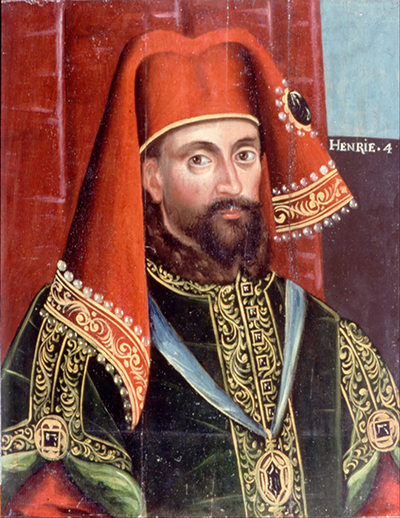



King Henry IV - Quick Stats




Born: April 15, 1367
King Henry IV of England: The Usurper Who Redefined the Monarchy
King Henry IV, born Henry Bolingbroke in April 1367, was the first monarch of England from the House of Lancaster. His reign, from 1399 to 1413, was marked by political upheaval, rebellion, and efforts to establish legitimacy following his controversial usurpation of the throne from his cousin, Richard II. Despite the challenges, Henry IV played a crucial role in shaping the English monarchy and setting the stage for future conflicts in the Wars of the Roses.
Early Life and Rise to Power
Henry was the son of John of Gaunt, Duke of Lancaster, and Blanche of Lancaster. He was well-educated and grew up among England’s nobility, forming alliances with influential figures. As a young man, he was known for his military prowess, particularly during his campaigns in Prussia and Lithuania with the Teutonic Knights. He also embarked on a pilgrimage to the Holy Land, demonstrating his piety and ambition.
Henry was the son of John of Gaunt, Duke of Lancaster, and Blanche of Lancaster. He was well-educated and grew up among England’s nobility, forming alliances with influential figures. As a young man, he was known for his military prowess, particularly during his campaigns in Prussia and Lithuania with the Teutonic Knights. He also embarked on a pilgrimage to the Holy Land, demonstrating his piety and ambition.
Initially loyal to King Richard II, Henry’s relationship with his cousin deteriorated over time due to Richard’s increasingly autocratic rule and disputes over inheritance. Tensions rose when Richard II banished Henry from England in 1398 following a dispute with Thomas de Mowbray, Duke of Norfolk.
Henry IV died on March 20, 1413, at Westminster Abbey. According to tradition, he had long desired to make a pilgrimage to the Holy Land, but his worsening health prevented him from doing so. His son, Henry V, succeeded him and went on to achieve military glory at the Battle of Agincourt, securing a major English victory against France.
The situation worsened when John of Gaunt died in 1399, and Richard seized Henry’s Lancastrian inheritance, effectively disinheriting him. This prompted Henry to return to England with a small force, initially claiming only his rightful lands. However, he quickly gained support from disaffected nobles and, within months, successfully deposed Richard II, assuming the throne as King Henry IV in September 1399.
Wives:
Father: John of Gaunt (son of Edward III)
Mother: Blanche of Lancaster
Died: March 20, 1413
The most serious internal threat came from the powerful Percy family, led by Henry Percy (Hotspur). The Percys had initially supported Henry’s rise to power but later turned against him due to disputes over rewards and military funding. This led to the Percy Rebellion and culminated in the Battle of Shrewsbury in 1403, where Henry IV’s forces emerged victorious, and Hotspur was killed. However, unrest continued as the remaining Percy family members launched further uprisings in subsequent years.
Henry IV also faced threats from France and Scotland. The French court, sympathetic to Richard II, backed various plots to destabilize Henry’s rule, while Scottish incursions into northern England added to his military burdens. England’s ongoing conflict with France, later known as the Hundred Years’ War, demanded strategic diplomacy and military action.
Henry IV’s reign is significant for its impact on governance, military campaigns, and religious policies. He proved that an English king could successfully seize and hold the throne without direct descent from the previous monarch’s primary heir. His ability to suppress multiple uprisings showed his resilience, though it came at the cost of constant instability and heavy taxation, which made his rule unpopular in some circles.
Religious conflict also troubled Henry’s reign. He passed the De Heretico Comburendo Act in 1401, which authorized the burning of heretics, primarily aimed at suppressing the Lollard movement led by John Wycliffe’s followers. The Lollards called for church reforms and translated the Bible into English, challenging the authority of both the monarchy and the church. Henry’s harsh response demonstrated his concerns about maintaining religious orthodoxy and political stability.
Later Years and Death
By the later years of his reign, Henry IV suffered from serious health issues, possibly a form of skin disease or epilepsy. Some historians speculate he may have had leprosy or a condition like syphilis. His deteriorating health limited his ability to govern effectively, and his son, the future Henry V, increasingly took on responsibilities. Disputes between father and son became evident, with Prince Henry and his allies seeking a more aggressive foreign policy, particularly regarding France.
By the later years of his reign, Henry IV suffered from serious health issues, possibly a form of skin disease or epilepsy. Some historians speculate he may have had leprosy or a condition like syphilis. His deteriorating health limited his ability to govern effectively, and his son, the future Henry V, increasingly took on responsibilities. Disputes between father and son became evident, with Prince Henry and his allies seeking a more aggressive foreign policy, particularly regarding France.
Despite his ailments, Henry IV remained determined to secure his dynasty. He attempted to manage the ongoing conflicts and rebellions while also focusing on diplomatic relations, including negotiating truces with France and Scotland. However, his health continued to decline, and he suffered from debilitating attacks that left him incapacitated for extended periods.
King Henry IV remains a significant figure in English history, remembered both for his bold seizure of the throne and the challenges he faced in securing his rule. His legacy continues to be explored in literature, including Shakespeare’s plays Henry IV, Part 1 and Henry IV, Part 2, which dramatize his reign and the rise of his son, Prince Hal. These plays portray him as a troubled but determined ruler, grappling with rebellion, legitimacy, and the weight of kingship. His story remains an essential chapter in the broader narrative of English history, illustrating the complexities of medieval monarchy and the enduring struggle for power.
Predecessor: King Richard II
Successor: King Henry V
Challenges and Rebellions
Henry IV’s reign was fraught with challenges, as his claim to the throne was contested. He faced multiple rebellions, including the uprising of the Welsh leader Owain Glyndwr in 1400, which evolved into a prolonged and costly conflict.
Henry IV’s reign was fraught with challenges, as his claim to the throne was contested. He faced multiple rebellions, including the uprising of the Welsh leader Owain Glyndwr in 1400, which evolved into a prolonged and costly conflict.
Legacy
Despite his turbulent reign, Henry IV established the Lancastrian dynasty and demonstrated the power of the English monarchy to overcome political strife. His rule set the stage for the later conflicts of the Wars of the Roses and highlighted the ongoing struggle for legitimacy and stability within the medieval English monarchy.
Despite his turbulent reign, Henry IV established the Lancastrian dynasty and demonstrated the power of the English monarchy to overcome political strife. His rule set the stage for the later conflicts of the Wars of the Roses and highlighted the ongoing struggle for legitimacy and stability within the medieval English monarchy.
Children:
Mary de Bohun (m. 1380–1394, her death)
Henry V (his successor)
Thomas of Lancaster
John of Lancaster
Humphrey of Gloucester
Blanche of England
Philippa of England
Joan of Navarre (m. 1403–1413)

Glyndwr declared himself Prince of Wales and garnered significant support, particularly from the Welsh gentry. His rebellion, lasting over a decade, severely strained Henry’s resources and required persistent military campaigns to suppress.


